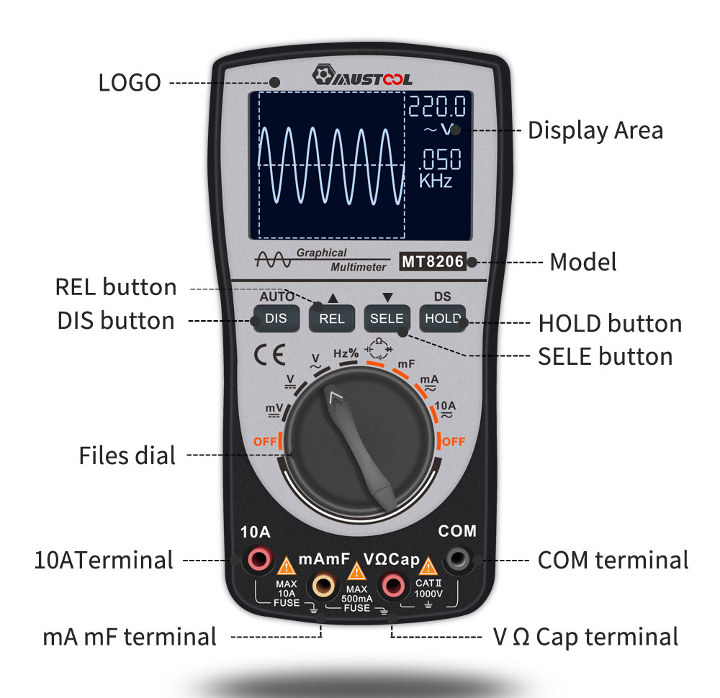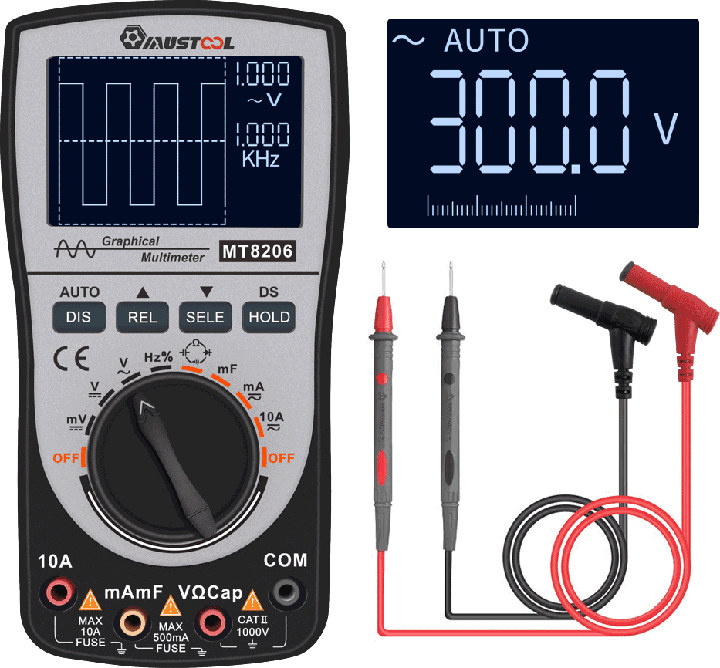MUSTOOL MT8206 looks like a standard digital multimeter, but the device is actually a 2-in-1 device that also serves as a oscilloscope.
Banggood have the digital multimeter scope on sale now for $47.99 shipped – going down to $42.23 with 12MT8206 coupon – as part of their 12th anniversary promotion running until September 7th.
MUSTOOL MT8206 specifications:
- Sampling – 200 ksps (max), 3999 counts
- Bandwidth – 20 kHz
- Screen – 128×64 dot matrix LCD display
- Function Ranges
- DC voltage – 400mV, 4V/40V/400V/1000V
- AC voltage – 400mV/4V/40V/400V/750V
- DC & AC current – 40mA/400mA, 4A/10A
- Resistance – 400.0 Ohm to 40.00 MOhm
- Capacitance – 0.1μF-100μF/10mF
- Frequency – 5Hz to 5MHz
- Measuring Range – Manual/auto range
- Storage Capacity – 100 data sets, 10 wave forms
- Input Resistance – 10MΩ
- Misc – Auto power off function, relative value,
- Power Supply – 3x AA batteries
- Dimensions – 160 x 83 x 32 mm
- Weight – 190 grams
 Switching between multimeter and waveform display is simply done by pressing the DIS button.
Switching between multimeter and waveform display is simply done by pressing the DIS button.
The unit ships with a bag, a pair of probes, and a user’s manual. Note the oscilloscope mode will be limited with a 5 MHz max frequency, and a 20 kHz bandwidth.
The product is fairly new, so I could not find any independent reviews just yet. However, several people from EEVLOG have already purchased MT8206 DMM scope, and at least one plans to review it. Sadly, if you want to benefit from the anniversary price, you would not be able to wait for a review since this price will only be valid until September 7th.

Jean-Luc started CNX Software in 2010 as a part-time endeavor, before quitting his job as a software engineering manager, and starting to write daily news, and reviews full time later in 2011.
Support CNX Software! Donate via cryptocurrencies, become a Patron on Patreon, or purchase goods on Amazon or Aliexpress






I bought my multimeter 18 years ago (a wavetek something) and each time I think about “upgrading” it, I can’t find all its features or ranges : capacitors 1pf to 2000µF, inductors from 1pH to 20mH, frequency from 0.001Hz to 20 MHz, resistors from 0.1 ohm to 2000 Mohms, plus the usual volt/amp ranges. It’s very hard to find such wide ranges and all these features together. It gets even worse when you add extra functions (oscilloscope, transistors). The only pain I feel with it is having to change the plug between (capacitors/inductors) and (diodes,resistors,volts). Overall it was well thought (even includes auto-poweroff, and lasts a very long time on a battery, I change them every ~3 years), I never fried it (blew a few fuses several times however). It looks like the combination of everything into a single device is not the priority anymore these days. The model above is almost an exception to this, yet it features narrower ranges for all dimensions.
So, dont replace your old multimeter and buy instead a real oscilloscope 🙂
I do have one. A pretty nice one (4x100MHz). But it makes noise and I don’t use it often. Plus it’s less portable than the multimeter. I’d say that a “multimeter with history” would be nice : a very low frequency sweep can show you a battery discharge rate or show some small signals. But I’d like at least not to loose what I like in my current device.
20kHz bandwidth… Has it any use???
Audible range is 20Hz-20kHz with LFE covering 3-120Hz so those ranges aren’t uncommon when working on musical gear, microphones and speakers.
Of course, for recording purposes you’d at least double range following Nyquist theorem… But for diagnosing and repairing gear on the go, this should suffice.
Are the waveforms real or pre-programmed? In the product description they only show perfect waveforms…
“Note the oscilloscope mode will be limited with a 5 MHz max frequency, and a 20 kHz bandwidth.”
The manual talks about 200 Khz sampling frequency.
This will definitely not allow for a 5 Mhz frequency.
BTW the cables seem to be good antenna’s.
Someone should make a fully open source/open hardware Multimeter.
Maybe this one will experience a replacement firmware, a bit like the TS100 soldering iron. But honestly I’d prefer to have a durable and long battery life one than a device hacked in a garage that lasts two hours on battery because the MCU and the screen drain the battery very fast, or one that dies the first time its inputs see an electric arc.
Just needs your effort
https://www.allaboutcircuits.com/textbook/experiments/chpt-3/make-your-own-multimeter/
https://www.banggood.com/DIY-DT-830T-Digital-Multimeter-Electronic-Training-Kit-p-1140316.html?
https://www.banggood.com/DIY-DT830B-Digital-Multimeters-Kit-Electronic-Learning-Kit-p-970326.html?
🙂
Somebody has started a Open source high accuracy DC Multimeter
https://opendcm.blogspot.com/